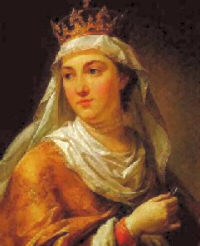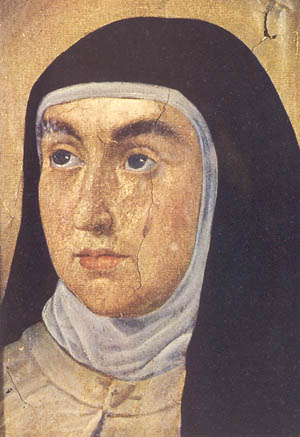Feast of Christ the King

In his Encyclical of December 11, 1925, H.H. Pius XI denounced the great modern heresy of laicism. It refuses to recognize the rights of God and His Christ over persons and peoples and organizes the lives of individuals, families and of society itself, as though God did not exist. This laicism ruins society, because in place of the love of God and one's neighbour, it substitutes pride and egoism. It begets jealousy between individuals, hatred between classes and rivalry between nations.
The world denies Christ because it ignores His royal prerogatives. It must be instructed on this subject. Now "a yearly feast can attain this end, more effectively than the weightiest documents issued by ecclesiastical authority." The Holy Father has instituted this new feast to be a public, social and official declaration of the royal rights of Jesus, as God the Creator, as The Word Incarnate, and as Redeemer. This feast makes these rights to be known and recognized, in a way most suitable to man and to society by the sublimest acts of religion - particularly by Holy Mass. In fact, the end of the Holy Sacrifice is the acknowledgment of God's complete dominion over us, and our complete dependence on Him. And this act is accomplished, not only on Calvary but also through the royal priesthood of Jesus which never ceases in His kingdom, which is heaven. The great reality of Christianity is not a corpse hanging from a cross, but the risen Christ reigning in all the glory of His triumph in the midst of His elect who are His conquest (Epistle). And that is why the Mass begins with the finest vision of the Apocalypse where the Lamb of God is acclaimed by angels and saints (Introit).
The Holy Father has expressed his wish that this feast should be celebrated towards the end of the liturgical year, on the last Sunday of October, as the consummation of all the mysteries by which Jesus has established His royal powers and nearly on the eve of All-Saints, where He already realizes them in part in being "the King of kings and the crown of All Saints" (Invitatory at Matins); until He shall be the crown of all those on earth whom He saves, especially by the Mass. It is indeed principally by the Eucharist which is both a sacrifice and a sacrament, that Christ, now in glory, assures the results of the victorious sacrifice of Calvary, by taking possession of souls through the application of the merits of His Passion (Secret) and thereby unites them as members to their head. The end of the Eucharist, says the Catechism of the Council of Trent, is "to form one sole mystic body of all the faithful" and so to draw them in the cult which Christ, king-adorer, as priest and victim, rendered in a bloody manner on the cross and now renders, in an unbloody manner, on the stone altar of our churches and on the golden altar in heaven, to Christ, king-adored, as Son of God, and to His Father to whom He offers these souls (Preface).
Dignus est agnus, qui occisus est, accipere virtutem, et divinitatem, et sapientiam, et fortitudinem, et honorem. Ipsi gloria et imperium in saecula saeculorum. * Deus, judicium tuum Regi da: et justitiam tuam Filio Regis.
The lamb that was slain is worthy to receive power and divinity and wisdom and strength and honour. To Him be glory and empire for ever and ever. * Give to the king Thy judgement, O God; and Thy justice unto the king's son.
(Apocalypse 5 and 1, and Psalm 71, from the Introit of Mass)
Omnipotens sempiterne Deus, qui in dilecto Filio tuo, universorum Rege, omnia instaurare voluisti: concede propitius; ut cunctae familiae Gentium, peccati vulnere disgregatae, ejus suavissimo subdantur imperio.
Almighty, everlasting God, who hast willed to restore all things in thy beloved Son, the King of the universe, mercifully grant that all the nations of mankind who are torn asunder by the wounds of sin, may submit to his most sweet rule.
(Collect)
Lesson from the Epistle of blessed Paul the Apostle to the Colossians.
Brethren : Giving thanks to God the Father, who hath made us worthy to be partakers of the lot of the saints in light : who hath delivered us from the power of darkness, and hath transferred us into the kingdom of the Son of His love, in whom we have redemption through His blood, the remission of sins ; who is the image of the invisible God, the first born of every creature : for in Him were all things created in heaven and on earth, visible and invisible, whether thrones, or dominations, or principalities, or powers. All things were created by Him and in Him; and He is before all, and by Him all things consist. And He is the head of the body the Church, who is the beginning, the first-born from the dead, that in all things, He may hold the primacy : because in Him, it hath well pleased the Father that all fulness should dwell; and through Him to reconcile all things unto Himself, making peace through the blood of His cross, both as to the things on earth, and the things that are in heaven, in Jesus Christ our Lord.
(Coloss. 1:12-20)
Continuation of the holy Gospel according to St. John.
At that time : Pilate said to Jesus: Art Thou the King of the Jews? Jesus answered: Sayest thou this thing of thyself, or have others told it thee of Me? Pilate answered: Am I a Jew? Thine own nation and the chief priests have delivered Thee up to me: what hast Thou done? Jesus answered: My kingdom is not of this world. If My kingdom were of this world, My servants would certainly strive that I should not be delivered to the Jews; but now My kingdom is not from hence. Pilate therefore said to him: Art thou a King then? Jesus answered: Thou sayest that I am a King. For this was I born, and for this came I into the world, that I should give testimony to the truth. Every one that is of the truth, heareth My voice.
(St John 18:33-37)
Lord of the ages evermore,
Each nation's King, the wide world o'er,
O Christ, our only Judge thou art,
And Searcher of the mind and heart.
Through Sin with rebel voice maintain,
We will not have this Christ to reign,
Far other, Lord, shall be our cry,
Who hail thee King of kings most High.
O thou eternal Prince of peace,
Subdue man's pride, bid error cease,
Permit not sin to wax o'er-bold,
The strayed bring home within the fold.
For this thou hangedst on the Tree
With arms outstretched in loving plea;
For this thou shewedst forth thy Heart,
On fire with love, pierced by the dart.
And yet that wounded side sheds grace
Forth from the altar's holy place,
Where, veiled 'neath humblest bread and wine,
Abides for man the life divine.
Earth's noblest rulers to thee raise
Their homage due of public praise;
Teachers and judges thee confess;
Art, science, law, thy truth express.
Let kings be fain to dedicate
To thee the emblems of their state;
Rule thou each nation from above,
Rule o'er the people's homes in love.
All praise, King Jesu, be to thee,
The Lord of all in majesty;
Whom with the Father we adore,
And Holy Ghost for evermore. Amen.
(Hymn for Vespers, from the Roman Breviary)
 Judicant sancti gentes, et dominantur populis: et regnabit Dominus Deus illorum in perpetuum. * Exsultate, justi, in Domino: rectos decet collaudatio.
Judicant sancti gentes, et dominantur populis: et regnabit Dominus Deus illorum in perpetuum. * Exsultate, justi, in Domino: rectos decet collaudatio.



























